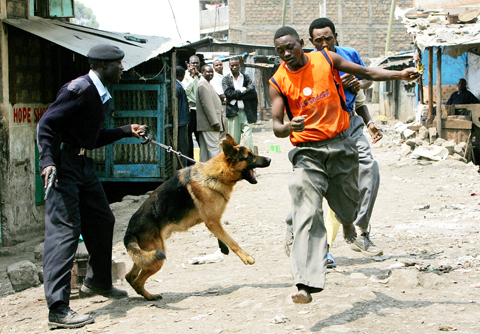A Kenyan policeman who was later killed saw other police officers execute 58 suspects instead of arresting them, he is seen saying on a newly released video.
The Kenya National Commission on Human Rights, a government appointed body, released the video on Tuesday and demanded the resignation of the country’s police chief, Mohammed Hussein Ali, to allow an investigation to take place.
In the recording, made by the commission in July, Police Constable Bernard Kiriinya described how, as a driver with the Special Crimes Prevention Unit, he witnessed 58 such executions within one year. Kiriinya added that his seniors sometimes said Ali ordered the killings.

PHOTO: AP
Four months later Kiriinya was killed, commission vice chairman Hassan Omar Hassan said.
“Based on our preliminary investigation on the circumstances surrounding his death ... [the commission] strongly believes that the police are behind the execution of the whistleblower,” Hassan told journalists.
Hassan said Ali should resign to allow investigations because Kiriinya’s testimony “alarmingly reveals that at its most extreme the Kenya police may be a highly corrupt criminal racket and that the police and organized crime may be one and the same.”
The commission released the video as Philip Alston, a UN expert on extra-judicial killings, was winding up a visit to Kenya to investigate deaths blamed on security forces.
Police spokesman Eric Kiraithe said the commission’s claims were “callous and irresponsible.”
Kiraithe said that Kiriinya worked for the police in Nairobi until Oct. 3, 2007, when he was transferred to a station in Kenya’s dry and harsh northwestern area. He failed to report for duty there and was declared a deserter.
Kamanda Mucheke, a human rights officer with the commission, said the body gave the government the video, anonymous testimonies of other policemen corroborating what Kiriinya said and other evidence months ago, but no action has been taken.
In the one-and-a-half-hour video, Kiriinya describes, among others, the killing of one of the country’s most wanted fugitives. Kiriinya says he witnessed fellow policemen in February 2007 killing Simon Matheri Ikere, first shooting him in back of the head, while Ikere was lying on his stomach.

Seven people sustained mostly minor injuries in an airplane fire in South Korea, authorities said yesterday, with local media suggesting the blaze might have been caused by a portable battery stored in the overhead bin. The Air Busan plane, an Airbus A321, was set to fly to Hong Kong from Gimhae International Airport in southeastern Busan, but caught fire in the rear section on Tuesday night, the South Korean Ministry of Land, Infrastructure and Transport said. A total of 169 passengers and seven flight attendants and staff were evacuated down inflatable slides, it said. Authorities initially reported three injuries, but revised the number

One of Japan’s biggest pop stars and best-known TV hosts, Masahiro Nakai, yesterday announced his retirement over sexual misconduct allegations, reports said, in the latest scandal to rock Japan’s entertainment industry. Nakai’s announcement came after now-defunct boy band empire Johnny & Associates admitted in 2023 that its late founder, Johnny Kitagawa, for decades sexually assaulted teenage boys and young men. Nakai was a member of the now-disbanded SMAP — part of Johnny & Associates’s lucrative stable — that swept the charts in Japan and across Asia during the band’s nearly 30 years of fame. Reports emerged last month that Nakai, 52, who since

EYEING A SOLUTION: In unusually critical remarks about Russian President Vladimir Putin, US President Donald Trump said he was ‘destroying Russia by not making a deal’ US President Donald Trump on Wednesday stepped up the pressure on Russian President Vladimir Putin to make a peace deal with Ukraine, threatening tougher economic measures if Moscow does not agree to end the war. Trump’s warning in a social media post came as the Republican seeks a quick solution to a grinding conflict that he had promised to end before even starting his second term. “If we don’t make a ‘deal,’ and soon, I have no other choice but to put high levels of Taxes, Tariffs, and Sanctions on anything being sold by Russia to the United States, and various other

‘BALD-FACED LIE’: The woman is accused of administering non-prescribed drugs to the one-year-old and filmed the toddler’s distress to solicit donations online A social media influencer accused of filming the torture of her baby to gain money allegedly manufactured symptoms causing the toddler to have brain surgery, a magistrate has heard. The 34-year-old Queensland woman is charged with torturing an infant and posting videos of the little girl online to build a social media following and solicit donations. A decision on her bail application in a Brisbane court was yesterday postponed after the magistrate opted to take more time before making a decision in an effort “not to be overwhelmed” by the nature of allegations “so offensive to right-thinking people.” The Sunshine Coast woman —